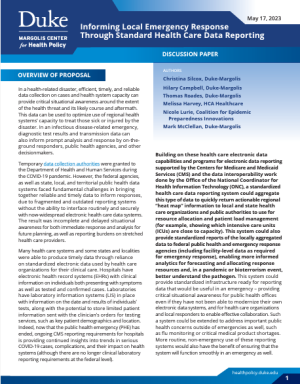
Informing Local Emergency Response Through Standard Health Care Data Reporting
Published date
Overview:
In a health-related disaster, efficient, timely, and reliable data collection on cases and health system capacity can provide critical situational awareness around the extent of the health threat and its likely course and aftermath. A standardized reporting system with a single entity responsible for data collection, and with the capacity to rapidly analyze and securely distribute the aggregated, deidentified data for actionable insights, is critically needed for emergencies. Data from this system can be used to optimize the capacity of regional health systems and inform prompt analysis and response by entities on the ground. The Centers for Medicare and Medicaid Services (CMS) could use its existing capabilities to serve as the implementation entity for such a reporting system to provide standard, efficient, and reliable health care data collection in a public health emergency.
Key Takeaways:
- Building on its programs for health care data reporting, CMS could serve as the implementation entity within the federal government responsible for standard, efficient, and reliable health care data collection in a public health emergency.
- CMS could contract with a third-party entity to support standard electronic data collection from health care organizations, including clinical laboratories, and aggregation of such data into timely reports of case results, laboratory results, and (where necessary) key subgroup data across different subpopulations. A public-private collaboration to could allow automation, ease burden and confusion, improve the quality of reporting, and provide a valuable and reliable bi-directional flow of de-identified, aggregate information to support emergency response.
- This standardized health care data reporting system could quickly return actionable regional “heat map” information to local and state health care organizations and public authorities to use for resource allocation and return standardized reports of the local aggregated data to federal public health and emergency response agencies, enabling more informed analytics for forecasting. In certain types of emergencies, A CMS-based system has the potential to eliminate some of the considerable manual effort involved in traditional infectious disease reporting through local agencies.
- CMS should support a process through its rulemaking and related programs to incorporate public comment, health information technology standards implementation, existing private efforts to help health care organizations share and assess gaps and opportunities to improve population health, and guidance from public health agencies to establish an efficient infrastructure for timely and reliable emergency data reporting.
- System development should be guided by these key principles: (1) the purpose and uses of reported data are clear, including clear benefits to participating organizations; (2) proprietary and sensitive information is safeguarded; (3) the electronic data reporting process is standardized and streamlined to minimize administrative burden and maximize data consistency, building on ONC’s existing and ongoing interoperability efforts and electronic data standards and CMS quality and safety reporting requirements; and (4) an effective mechanism for deidentified data sharing is implemented, including the provision of timely analytics and insights from the aggregated data to local disaster relief officials and health care organizations.
